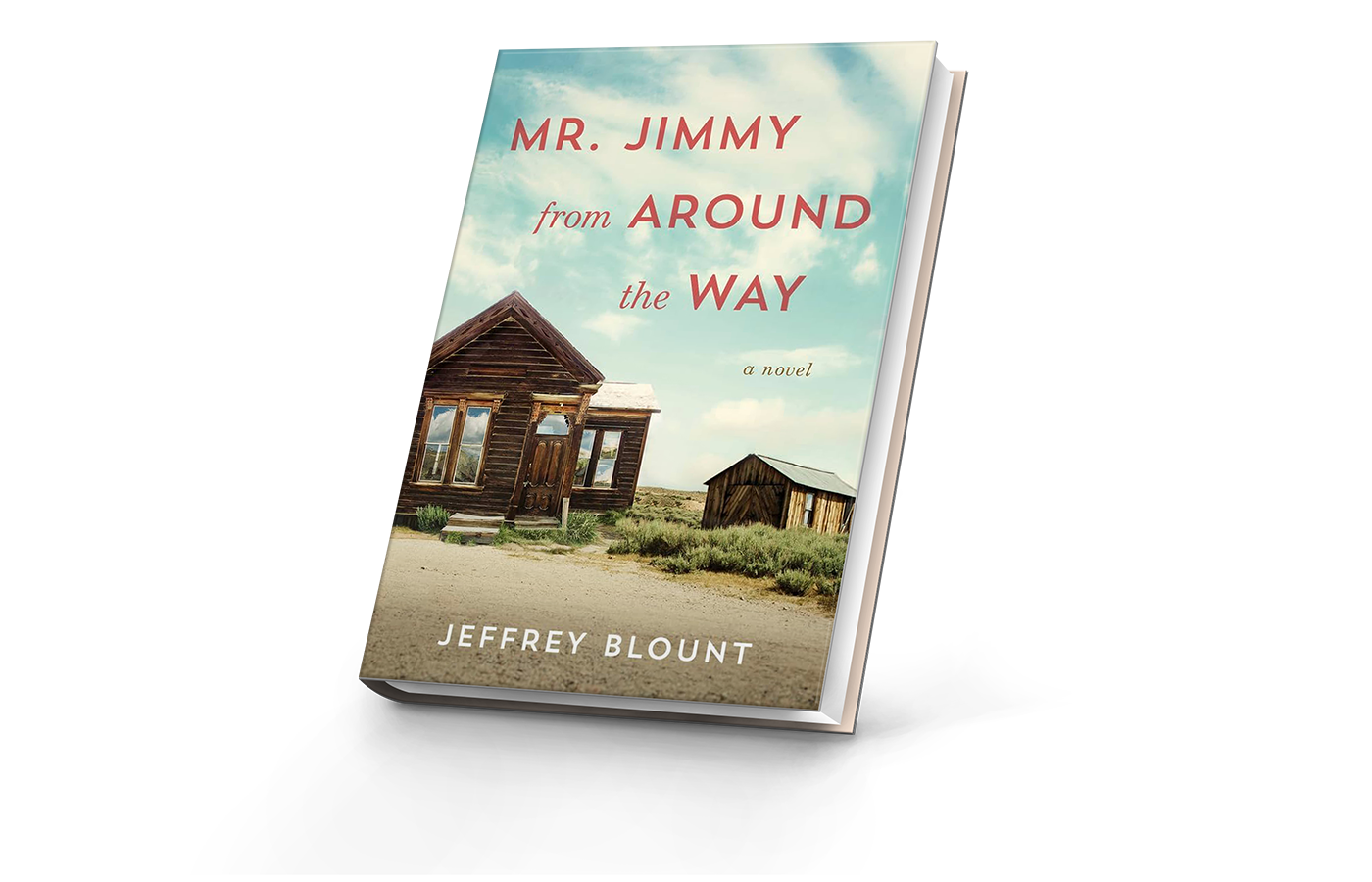
Books
An ‘activism of kindness’
Broadcast journalism alum and former “Meet the Press” director Jeffrey Blount takes on race and class in “Mr. Jimmy From Around the Way.”
Inspired by authors Toni Morrison, James Baldwin and John Irving, Jeffrey Blount (B.S.’81) always wanted to be a novelist, writing his first book during his freshman year of college.
“It was a first attempt that didn’t deserve to be published,” Blount says. “But I got my feet wet and I knew then that one day writing novels would be a part of my life.”
After 34 years at NBC, where he had stints as the director of “Meet the Press,” “NBC Nightly News” and the “Today” show and won an Emmy, he finally made writing novels his life — and in the image of his three greatest influences.
“They all helped me find my voice as a writer,” Blount says. “They taught me how to be a literary activist for issues I felt strongly about.”
In January, Beaufort Books, an independent publisher with four New York Times bestsellers since 2007, released Blount’s fourth novel, “Mr. Jimmy From Around the Way,” which follows the travails of Black billionaire James Henry Ferguson (Mr. Jimmy), his very public fall from grace and his subsequent slow, often bumpy, path to redemption.
“Every day we are to go out and not just look for random moments of kindness but to see our fellow human beings in need and go about setting it right. Mr. Jimmy is a representation of that” — who reaps his own benefits, Blount says. “When you’re feeling badly about yourself, go out and do something to change someone’s life.”
Blount says he wrote “Mr. Jimmy From Around the Way,” in part, to draw attention to America’s problems with poverty as well as the lack of health care, education and government aid that often define underprivileged U.S. communities.
“I can now take on these missions,” says Blount, who retired from NBC in 2017. “This is the legacy I want to be remembered for.”
Blount, who grew up in Smithfield, Virginia, about 80 miles south of Richmond, says part of the inspiration for “Mr. Jimmy From Around the Way” comes from his wife, Jeanne Meserve, a former anchor and correspondent for CNN and ABC. In the mid-2000s, a news story took her to rural Louisiana.
“She ended up getting lost and came upon some places that just shocked her,” Blount says. “The incident came up again when we were all cooped up during [the onset] of COVID, and it brought back the idea that I wanted to talk about rural poverty. Having grown up in the rural South, I’d seen it: the lack of decent housing, health care, basic services — in communities lost to the rest of us. I’d been carrying around those stories and issues until I came up with a way I wanted to represent them.”
Those depressed Louisiana locales sparked the novel’s setting: the fictional Ham, Mississippi.
Named for an Old Testament character cursed by God, Ham is the backwater where Mr. Jimmy flees after a scandal. He buys a house there, sight unseen, in the most brokedown part of town known only as “around the way,” where he finds his new neighbors — not coincidentally, all Black — living in appalling conditions: no hot water, no gas, houses literally crumbling.
“Ham [in the Bible] was lowered to a lesser level of humanity,” Blount says; thus the name signifies “a town left alone and left below the rest of us.”
And as rural poverty still exists, so does racism with the two often related.
As the white men who run the town initially stymie Mr. Jimmy’s efforts to improve his neighbors’ lives, one character succinctly sums it up: “You are a formidable man, but you are Black and this is Mississippi.”
Blount says that to pretend that racism is a thing of the past is muddle-headed at best, self-serving at worst. Yet it exists side by side with his belief that it can be overcome with clear-eyed hope and a determined, practical approach — what Blount calls an “activism of kindness.”
Every time he learns the book has spurred a reader to action, “‘Mr. Jimmy’ is doing what it was meant to do,” he says.
“I’m happy it’s doing that and hope it continues to do that,” he says, adding, with no small satisfaction, “You love it when a plan comes together.”

MORE BOOKS
Here’s a glance at a few other books VCU faculty and graduates are writing these days …
“Last Chance Chicago” (Bywater Books, 2022)
Diana DiGangi (B.S.’16, M.S.’18)
This first novel by DiGangi takes on the cutthroat world of high finance and the intricacies of intimacy, as attorney Sam DiCiccio finds herself defending her ex-wife, hedge fund manager Amy Igarashi, against bogus insider trading charges. Sam, a recovering cocaine addict, still carries a torch for Amy; Amy is understandably wary of reconnecting. The pair stumble on a nefarious corporate conspiracy that goes well beyond a few white-collar greedheads.
“African Musicians in the Atlantic World: Legacies of Sound and Slavery” (University of Virginia Press, 2023)
Mary Caton Lingold, Ph.D.
America’s contribution to music owes a huge debt to African Americans, who largely created jazz, blues and rock ’n’ roll. But what of the music their ancestors taken from Africa brought with them? It’s this period — roughly 1600-1800 — that Lingold, an associate professor of English and herself a musician, examines, drawing on archival sources, including musical instruments, to reveal long-forgotten musicians and their music.
“Joy Rides Through the Tunnel of Grief” (University of Georgia Press, 2023)
Jessica Hendry Nelson
What do you do when you face unfathomable loss? If you’re a writer, you write. Nelson had already bought the wedding dress when she learned her fiance didn’t want kids. Either choice — leaving her soulmate or abandoning her elemental yearning to be a mother — would leave her with a permanent taste of ashes. This trenchant collection of essays by the assistant professor of English also tackles her father’s long-ago death and her brother’s very present drug addiction as well as happier bonds of friendship and love.
“The Price of Truth: The Journalist Who Defied Military Censors to Report the Fall of Nazi Germany” (Cornell University Press, 2023)
Richard Fine, Ph.D.
Fine, an English professor emeritus, interrogates the adversarial relationship of the military and the press during World War II by examining the forgotten story of Edward Kennedy, who reported on Germany’s surrender on May 7, 1945 — a day before Allied Command wanted, citing national security. Kennedy, suspicious of their claims, paid a huge price. He was condemned by the government, shunned by his press corps peers and eventually fired.
“A Line in the Sand” (Little, Brown and Company, 2023)
Kevin Powers (B.A.’08)
Powers sets this novel in Tidewater, as Arman Bajalan, janitor at the Sea Breeze motel, finds a body on a Norfolk beach. Despite the familiar locale, the Iraq War casts a long shadow: Bajalan, a Kurdish refugee, fled after serving as an interpreter for the U.S., while other characters, including the victim, have close ties to the war. This is the third novel that Iraq veteran Powers has written about war, his second about Iraq and his first thriller. In it, he peels back the ugly “collateral damage” of the war, physical and psychic, for individuals and the U.S. body politic alike.
